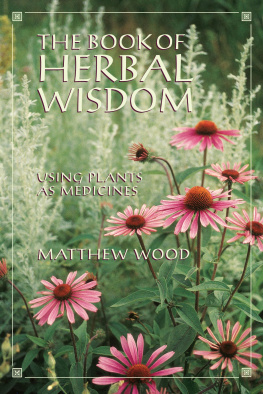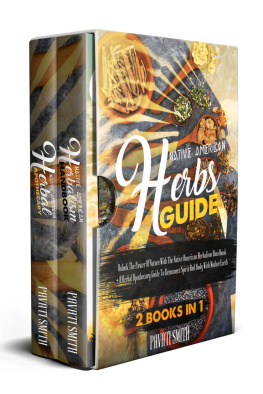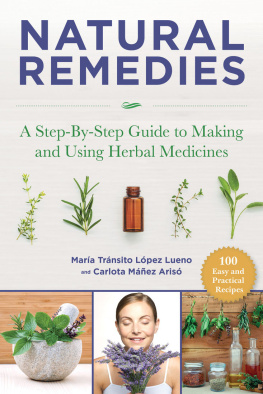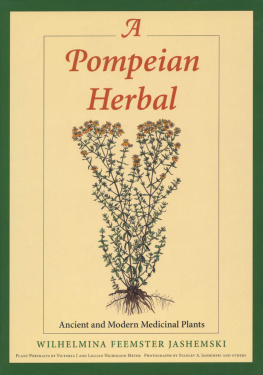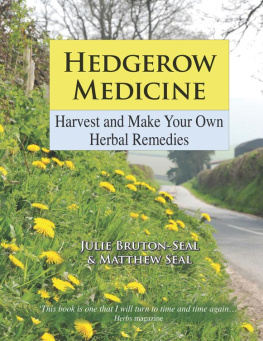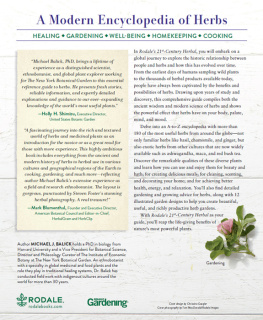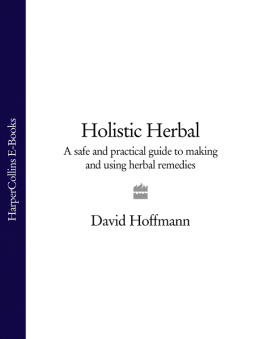Matthew Wood - The book of herbal wisdom : using plants as medicines
Here you can read online Matthew Wood - The book of herbal wisdom : using plants as medicines full text of the book (entire story) in english for free. Download pdf and epub, get meaning, cover and reviews about this ebook. City: Berkeley, Calif., year: 2017, publisher: North Atlantic Books, genre: Religion. Description of the work, (preface) as well as reviews are available. Best literature library LitArk.com created for fans of good reading and offers a wide selection of genres:
Romance novel
Science fiction
Adventure
Detective
Science
History
Home and family
Prose
Art
Politics
Computer
Non-fiction
Religion
Business
Children
Humor
Choose a favorite category and find really read worthwhile books. Enjoy immersion in the world of imagination, feel the emotions of the characters or learn something new for yourself, make an fascinating discovery.
- Book:The book of herbal wisdom : using plants as medicines
- Author:
- Publisher:North Atlantic Books
- Genre:
- Year:2017
- City:Berkeley, Calif.
- Rating:3 / 5
- Favourites:Add to favourites
- Your mark:
- 60
- 1
- 2
- 3
- 4
- 5
The book of herbal wisdom : using plants as medicines: summary, description and annotation
We offer to read an annotation, description, summary or preface (depends on what the author of the book "The book of herbal wisdom : using plants as medicines" wrote himself). If you haven't found the necessary information about the book — write in the comments, we will try to find it.
Matthew Wood: author's other books
Who wrote The book of herbal wisdom : using plants as medicines? Find out the surname, the name of the author of the book and a list of all author's works by series.
The book of herbal wisdom : using plants as medicines — read online for free the complete book (whole text) full work
Below is the text of the book, divided by pages. System saving the place of the last page read, allows you to conveniently read the book "The book of herbal wisdom : using plants as medicines" online for free, without having to search again every time where you left off. Put a bookmark, and you can go to the page where you finished reading at any time.
Font size:
Interval:
Bookmark:
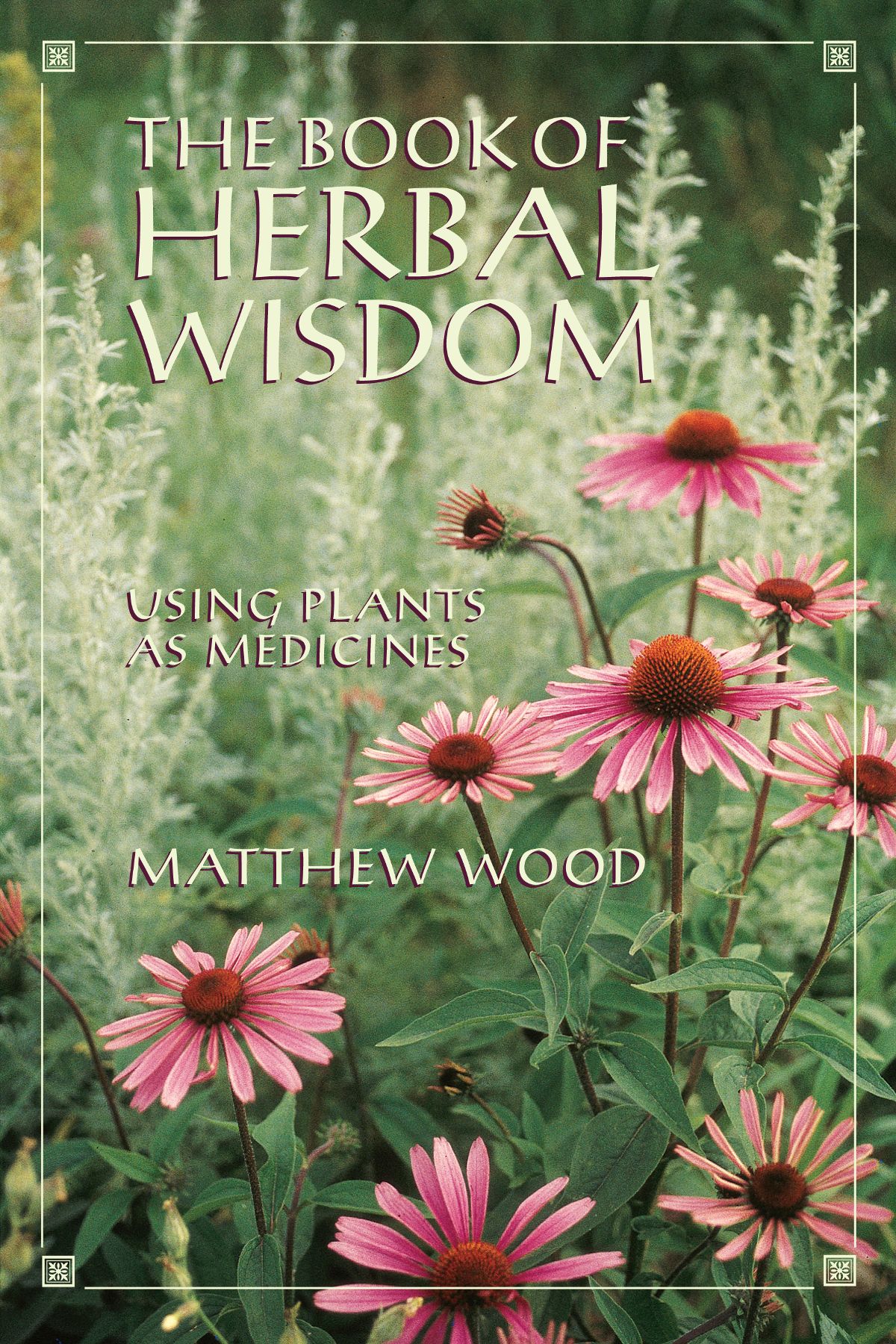
A LSO BY M ATTHEW W OOD
The Earthwise Herbal Repertory: The Definitive Practitioners Guide
The Earthwise Herbal: A Complete Guide to New World Medicinal Plants
The Earthwise Herbal: A Complete Guide to Old World Medicinal Plants
The Practice of Traditional Western Herbalism: Basic Doctrine, Energetics, and Classification
Vitalism: The History of Herbalism, Homeopathy, and Flower Essences
Seven Herbs: Plants as Teachers
MATTHEW WOOD

North Atlantic Books
Berkeley, California
Copyright 1997 by Matthew Wood. All rights reserved. No portion of this book, except for brief review, may be reproduced, stored in a retrieval system, or transmitted in any form or by any meanselectronic, mechanical, photocopying, recording, or otherwisewithout written permission of the publisher.
Published by North Atlantic Books Berkeley, California
Cover design by Andrea Du Flon
Cover photo by Ninon Sullivan
The Book of Herbal Wisdom is sponsored and published by the Society for the Study of Native Arts and Sciences (dba North Atlantic Books), an educational nonprofit based in Berkeley, California, that collaborates with partners to develop cross-cultural perspectives, nurture holistic views of art, science, the humanities, and healing, and seed personal and global transformation by publishing work on the relationship of body, spirit, and nature.
North Atlantic Books publications are available through most bookstores. For further information, visit our website at www.northatlanticbooks.com or call 800-733-3000.
ISBN-13: 978-1-55643-232-3
ISBN-13: 978-1-62317-124-7 (e-book)
Library of Congress Cataloging-in-Publication Data
Wood, Matthew, 1954
The Book of herbal wisdom: using plants as medicine/ Matthew Wood.
p.cm.
Includes .
ISBN 1-55643-232-1
1. HerbsTherapeutic use. I. Title.
RM666.H33W655 1997
615.321dc 21 96-49794
CIP
Dedication
To Dr. Frances Hole and Mr. Charles W. Brunelle
Also in memory of the late Ninon
There is no teaching until the pupil is brought into the same slate of principle in which you are; a transfusion takes place; he is you and you are he; then is a teaching, and by no friendly chance or bad company can he ever quite lose the benefit.
HENRY DAVID THOREAU
W hen I was about nine, my family traveled to Wausau, Wisconsin, to attend Northern Half Yearly Meeting. Thats the Quaker get-together in the Upper Midwest. In those days the train still ran from Minneapolis to Wausau. It was an adventure. The meeting was held at the Marathon County Historical Societythe county where they grow all the Ginseng. It was an old Victorian mansion full of curios and artifacts. For years afterwards I played with the facsimile Confederate money I bought in the gift shop; it reminded me of that wonderful weekend. Over the years, many of my significant dreamswhere ancient and profound truths are revealedwere set in old Victorian mansions.
First Day School, the Quaker version of Sunday School, was taught by an animated fellow named Francis Hole. He was a Soil Science professor at the University of Wisconsin. He took our class up on top of Rib Mountain, an old chunk of weathered volcanic core, worn down by eons of silent erosion; it constitutes the geological substratum of the Badger state. There was a fire tower on top. The air sparkled. I dont remember everything Francis taught us, but a feeling came out of him. Nature is alive, Nature is alive. That feeling sank into me and conjoined with the core of my being. It was an initiation into the invisible, spiritual life which resides inside the material husk of Mother Nature.
Years later, on a trip through Wisconsin, I stopped and visited Francis at his home near the Yahara River, on the isthmus which comprises the old city of Madison. I thanked him for the insights he brought me. Ah, yes, he mused, that was a magical weekend. I showed him my first book, Seven Herbs, Plants as Teachers (1987). I explained how I was trying to get across the idea, the feeling, that Nature is a living being, an entity full of life, awareness, and treasures of the spirit. People crave that knowledge, he commented. It is life itself and they cant live a happy life without it. Francis understood. I said good-bye and headed on to Minnesota.
For me, this revelation of the life of Nature began to manifest as an interest in herbal medicine. I felt that the plants were living representatives of this hidden world. They are like letters of the alphabet in the language of life. They were both healers and teachers of wisdom. They led me on to discover more about the unseen life behind the world.
What Francis began was expanded upon for me many years later. I met a woman in northern Minnesota whose grandfather had been a famous medicine man. Again, I felt a transmission of knowledge. It was at this time I learned that the living intelligence of Nature is articulated into seven simple lessons which form a beautiful and complete harmony. What I had previously experienced as a field of life or energy was now concisely defined. I now felt that I had completed something deeply significant. I have described these lessons in my previous book, Seven Herbs, Plants As Teachers.
To feel the living spirit and intelligence of Nature is the true foundation for developing a knowledge of herbal medicine. The people up north have an extensive tradition, but it is their own, and they are not particularly interested in teaching outsiders. The rest of my journey involved filling in the gaps. That means understanding how plants work from the perspective of Nature, not the perspective imposed on Nature by humanity. Every plant personifies some lesson about the operation of body, soul, life force, spirit or Nature. It took time to gain a perspective on such an enormous body of knowledge. The task is never done, each person has their own wisdom to assimilate, but the time came when I could share some of what I had learned.
When we learn to think as does Nature, we think in a different fashion from our custom. Nature has constructed patterns and whole units, such as wolf, carrot, diamond, heart. Scientific knowledge of nature and medicine is based upon a material, rational, reductive model, which emphasizes the pieces, not the whole, and assumes that Nature has no inherent logic.
Patterns, wholes and holism are constantly observed in Nature. We see lessons of this holism expressed in folk-medicine, in some of the alternative medical movements which have been shunned by modern science, and especially in the system of natural medicine practiced by the Indian people. It is unfortunate that this kind of wisdom is not respected. We have lost ninety-nine per cent of it. But there are still a lot of people who are working to remind us about Natural wisdom.
Through the years I have learned from a variety of teachers, practitioners, colleagues, and the plants themselves. In addition, I have learned from the steady stream of sick folk who have come to my door over the years. They were the final evidence of whether the herbs work or not. Among these many people, there is one who stands out from the rest.
I first got to know Susan when she came into Present Moment Herbs in Minneapolis, where I used to work. She was seeking help for a terminal illness. I have never met anybody who has been through as many near-fatal experiences as Susan, and over the years she came to be a constant source of medical experience for me. She became something like the archetypal patient, as well as a friend.
Next pageFont size:
Interval:
Bookmark:
Similar books «The book of herbal wisdom : using plants as medicines»
Look at similar books to The book of herbal wisdom : using plants as medicines. We have selected literature similar in name and meaning in the hope of providing readers with more options to find new, interesting, not yet read works.
Discussion, reviews of the book The book of herbal wisdom : using plants as medicines and just readers' own opinions. Leave your comments, write what you think about the work, its meaning or the main characters. Specify what exactly you liked and what you didn't like, and why you think so.

